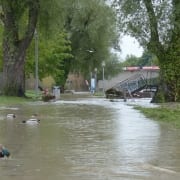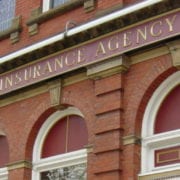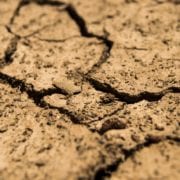Floodwaters are among the most damaging natural tragedies to come upon a property. They are relentless, unyielding and brutal. The only real defense against them is to be prepared so that you can hopefully avoid some of the damage they can bring. Here are 12 ways to protect your home or business against a flood.
- Downspouts. Be sure your structure has gutters and downspouts properly installed all the way around it. The downspouts should be routed far enough away from the building to give the water an external path for runoff.
- Gutters. Check your roof for any debris and make sure the gutters are clean so the rainwater can flow away freely.
- Runoff. Verify that any external drains or channels designed to route water away from the building are not blocked or impaired.
- Drains. Check any city storm drains near your location to verify they are not covered, and remove any blockage so the floodwaters can flow away.
- Foundation. Inspect your foundation for any cracks or shifts that might allow water to pass inside. Have any problems repaired, and consider adding extra levels of waterproofing to help repel floodwaters as they arrive.
- Landscaping. If flooding is an ongoing possibility for your location, you may want to consider adding some retaining walls or other landscaping designed to protect against rising waters.
- Sump Pump. Check your sump pump and drains to verify they are free and clear to remove water before it rises in the home.
- Backflow Valve. Have a backflow valve installed on your main sewer system. This keeps raw sewage from entering your home as floodwaters rise.
- Protect. Store your valuables safely above any flood lines for protection.
- Elevate. Elevate your expensive appliances and heating/cooling systems to keep them above the potential flood line. Also, consider having your electrical wiring and outlets raised to a safe level.
- Water Sensors. Electronic water sensors can alert you if there is a problem, allowing you to check your property and get valuables moved to safety.
- Plan Ahead. Have a plan in place for how to deal with an incident. Imagine floodwaters approaching your facility, and think of what you’d like to have ready at that time. Go through the motions of dealing with an issue, so you’ll be rehearsed and ready for a sudden surprise in the future.






